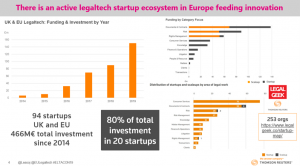 We have just had some very inspiring days in Madrid, attending the ELTA Ambassadors Think Tank and the European Legaltech Congress. It was so impressive to see how the European Legal Technology Association (ELTA) has grown to over 5,500 members in 39 countries and with Ambassadors (handpicked well-connected legal tech pioneers, who act as “swinging doors” between their country and the international level of ELTA) in many of them, including VQ Founder Helena Hallgarn for Sweden, working to drive change and innovation on the legal market.
We have just had some very inspiring days in Madrid, attending the ELTA Ambassadors Think Tank and the European Legaltech Congress. It was so impressive to see how the European Legal Technology Association (ELTA) has grown to over 5,500 members in 39 countries and with Ambassadors (handpicked well-connected legal tech pioneers, who act as “swinging doors” between their country and the international level of ELTA) in many of them, including VQ Founder Helena Hallgarn for Sweden, working to drive change and innovation on the legal market.
ELTA President Tobias Heining opened the European LegalTech Congress (ELTACon19) with a brief overview of the state of the legal market, which was then followed by panel discussions focusing on the future of the legal market from the associations’ respectively the technology providers’ and the firms’ point of view.
 The two-day ELTACon19 conference was full of great discussions and insights, and exciting speakers and panelists covering topics from digital legal services and strategies to buy and develop legal tech, to how tech is not the silver bullet and how it’s all about the “three Ps”; People, Process and Products. Here’s a photo from the first panel moderated by ELTA Vice President María Jesús González-Espejo.
The two-day ELTACon19 conference was full of great discussions and insights, and exciting speakers and panelists covering topics from digital legal services and strategies to buy and develop legal tech, to how tech is not the silver bullet and how it’s all about the “three Ps”; People, Process and Products. Here’s a photo from the first panel moderated by ELTA Vice President María Jesús González-Espejo.
Here are our main takeaways, which we found especially interesting:
- The inefficiency paradox of tools overload
 ThomsonReuters and LegalGeek maps the European LegalTech Startup Ecosystem in an annual report. According to the report, a record £62m of external investment already made in 2019 has taken total funding of UK legaltech startups to over £260m. As is evident from this picture, the ‘Documents and contracts’ category is by far the most common focus for solutions aimed at legal professionals. Capabilities are centered around document automation, document analysis and contract lifecycle management.
ThomsonReuters and LegalGeek maps the European LegalTech Startup Ecosystem in an annual report. According to the report, a record £62m of external investment already made in 2019 has taken total funding of UK legaltech startups to over £260m. As is evident from this picture, the ‘Documents and contracts’ category is by far the most common focus for solutions aimed at legal professionals. Capabilities are centered around document automation, document analysis and contract lifecycle management.
This reflects well the use of technology in law firms. According to the annual PwC Law Firms’ Survey the top UK law firms uses tech for collaboration, mobile application and automated document production. As many as half of the firms are using automation today. But, as Jim Leason, Customer Proposition Lead at Thomson Reuters, pointed out, automation does not give the expected result until law firms really start to understand and map their processes, and there is a lot of hard work to be done before predictive analysis and data-driven decision-making will have any true effect on the market.
 There is still too much focus on “the magic bullet” and many law firm tech teams are overwhelmed by lawyers in their organization asking for the one new wonder-tool. In fact, law firms experience something of an explosion of tools the lawyers have to use. Right now, there is therefore something of a paradox going on at law firms; the more tools to increase efficiency that are implemented, the more inefficiency they create.
There is still too much focus on “the magic bullet” and many law firm tech teams are overwhelmed by lawyers in their organization asking for the one new wonder-tool. In fact, law firms experience something of an explosion of tools the lawyers have to use. Right now, there is therefore something of a paradox going on at law firms; the more tools to increase efficiency that are implemented, the more inefficiency they create.
Henrik von Wehrs, LegalTech Engagement Manager Europe at Allen & Overy, confirmed this problem and explained that Allen & Overy no longer “throws new tools at the business”. Michael Kennedy, Innovation & Legal Technology Associate at Addleshaw Goddard, interposed though that the need for niche tools never will go away, but that law firms need to focus on platformisation, to use APIs or other ways of integrating all tools into one common place.
 Jim Leason emphasized that the key to stop this tools overload is for law firms to focus on (i) learning to use the implemented tools efficiently instead of implementing new ones, and (ii) to map the firm’s processes to find the inefficiencies and to reimagine legal design of the outcome of these processes, i.e. the documents, or even to realize that the outcome might not need to be a document at all.
Jim Leason emphasized that the key to stop this tools overload is for law firms to focus on (i) learning to use the implemented tools efficiently instead of implementing new ones, and (ii) to map the firm’s processes to find the inefficiencies and to reimagine legal design of the outcome of these processes, i.e. the documents, or even to realize that the outcome might not need to be a document at all.
Which lead to the question of the next panel discussion at ELTACon19 on how the legaltech that legal professionals would love look like?
- Finding the right LegalTech solution is like the Holy Grail quest
During these days, there were a lot of talk about how lawyers were getting tired of all “cool gadgets” presented to them and how difficult it was to find tech solutions that truly simplified or enhanced their work. As Hariolf Wenzler, ELTA Board Member, put it when he moderated a panel discussion on strategies to buy and develop legal tech, “looking for legaltech solutions can sometimes feel like the holy grail quest.”
In the discussion, David Salgado Areias, Partner at Areias Advogados, had some very insightful comments: Firstly, develop your own software is not the answer when you don’t know what to buy. Secondly, yes, we live surrounded by technology, but the fact that we like to use Instagram and Snapchat does not mean that we understand how to use or develop tech to use in the business, that are two different kind of skillsets.
In a recent workshop where the results from a survey on managed legal services in Germany by Bucerius Law School was discussed by the ELTA Ambassadors (see “A Comparison of Managed Legal Services in Europe”), it was concluded that the confusion about available IT solutions and lack of knowledge of the possibilities already existing was the greatest obstacle for legal professionals to manage their own daily work in a more efficient and less expensive way.
Andrés Jara, CEO and Founder at Alster Legal, confirmed this when pointing out that the problem is that many lawyers usually don’t know what they want or need, and therefore fail when it comes to choosing technology. Or even, that there might be a sense of urgency or desperation of law firm officers to buy new tools, just to show results, not because it’s the best tool and without the necessary preparations and analysis, but just to keep their jobs.
The key is however, not only to find the right tool, but also how to implement it in the best way. It was estimated that working out what to do is 10%, how to make it happen (i.e. the implementation) is 90%.
- Global struggle
Chantal Vermeire, Vice President of Strategy at Wolters Kluwer, presented the Future Ready Lawyer Report with the finding that there were not any significant differences between various jurisdictions, digitalization and the changing marketplace struggles seem to be a truly global trend. Instead of differences between jurisdictions or categories of professionals, there were three clear groups forming; technology leaders, transitioning or trailing organizations. And there is a struggle; 67% of law firm leaders do not feel comfortable to manage the required transformation.

In a survey conducted by ELTA prior to the ELTACon19 and discussed between the Ambassadors, these results were confirmed. The forerunners on the changing legal market are still though very much individual pioneers rather than any traditional players. But the large firms are catching up, and in some countries government and public administrations are pushing for the adaptation of legaltech. In Sweden, for example, the government innovation agency Vinnova had a special legaltech focus for their investment last year.
 The reasons for lagging behind for the traditional players were mostly a general resistance to change and fear of getting marginalized by technology, as well as regulatory obstacles and lack of competence and resources.
The reasons for lagging behind for the traditional players were mostly a general resistance to change and fear of getting marginalized by technology, as well as regulatory obstacles and lack of competence and resources.
Janet Huerta, Director at Foro Jurídico, made a good point in that almost all lawyers understand that they need to change, but they don’t know how. But in this new world, you don’t need to know everything, but you need to understand technology in a general sense so that you can speak the language of it and understands its possibilities and limitations. As a follow-up, Wolfgang Pichler, Head of Business Development at Manz, asked the audience if anyone thought that lawyers would benefit from learning to code, but there was an almost unanimous consensus that no, lawyers should not spend their valuable time on learning to code. We completely agree with this view, and believe that there is a misconception that lawyers learning to code will transform law or unlock lots of great software solutions to solve legal and organisational challenges. That is to underestimate the skill and knowledge of experienced coders. (Read more in our blog post “To code or not to code, that’s the question”.) The key is to work in interdisciplinary teams and to be better at appreciating other competences. The archaic and unhelpful distinction between “fee earners” and “non-fee earners” is in fact a blocker to innovation and effective use of technology to drive business value.
Another obstacle to change is the costs of innovation. According to a key note presentation by José Ángel Sandín, CEO at Lefebvre, 75% of lawyers feel the need to innovate, but only 23% of firms have allocated an innovation budget. Zohar Fisher, Founder Tech&Law, similarly pointed to the fact that using or delivering legaltech as a law firm requires a different financial management, and a new mindset across many dimensions.
- It’s the Big 4 that are really doing things
While law firms understand the need for change and are struggling to find out exactly how to achieve it, things are already beginning to happen for real in the Big 4. Or, as Sebastian Hartmann, Global Head of Technology Strategy at KPMG, explained when asked what he saw in his crystal ball, “I don’t spend time looking into a crystal ball, the present keeps me busy enough.” KPMG Legal is already amongst the top 20 law firm in Germany. The future of legal and professional services is already here. The traditional legal market will have to adjust.
 Sebastian Hartmann, explained how it’s not about having the best solution, it’s about delivering the best outcome. The biggest challenge is the business of keeping experts busy. You need to embrace that change will involve a lot of non-billable work. Another challenge is to move from being the best at a certain topic, to truly focus on the client’s perspective. Clients do not have a “labour law problem”, they have a business problem involving a labour law issue.
Sebastian Hartmann, explained how it’s not about having the best solution, it’s about delivering the best outcome. The biggest challenge is the business of keeping experts busy. You need to embrace that change will involve a lot of non-billable work. Another challenge is to move from being the best at a certain topic, to truly focus on the client’s perspective. Clients do not have a “labour law problem”, they have a business problem involving a labour law issue.
The future that we are creating right now holds a lot of opportunities and what is going on right now at the Big 4 changes the way legal services are provided.
- The explosion of in-house counsel work load
We have heard for a long time about how the size of in-house legal departments is increasing and how the work load just seems to be getting bigger and bigger, but the figures presented by Marcus M. Schmitt, General Manager of the European Company Lawyers Association (ECLA), were even more significant than that. There seems to be a structural shift where government tasks are relocated to the corporations, leading to both an increase in number of general counsel AND an increase in external spend. In Western Europe, the number of in-house lawyers per 1 bn revenue has increased from 2.5 lawyers to 4.9 (i.e. has doubled) in ten years. General Counsel is the fastest growing legal professional group of all.
This development is not sustainable, and all legal departments realize that legaltech is the next go to step. But, as mentioned in the workshop relating to the Bucerius Law School survey many General Counsel lack the means and knowledge of the possibilities already existing for them to manage their own daily work and their departments in a more efficient and less expensive way. Many legal departments are still struggling with this, to analyse and structure the process to find the best legaltech to fit their needs. For those having the process in order, the next struggle is to scan the market to find and evaluate available tech solutions.
Michael Kennedy, Innovation & Legal Technology Associate at Addleshaw Goddard, confirmed that most legal departments have small budgets and problems to get buy-ins for their tech needs (even in tech companies) and therefore turn to them for support in tools and platforms.

Finally, here are two last conclusions from the ELTACon19 to round up our key takeaways:
- We live in a time of great opportunities, open your mind to technology and, as Steve Jobs said, “stay hungry”.
- LegalTech providers must be prepared to be transparent and be better at providing tools that answer to the needs and requirements of the market, not focus on “cool gadgets”.

